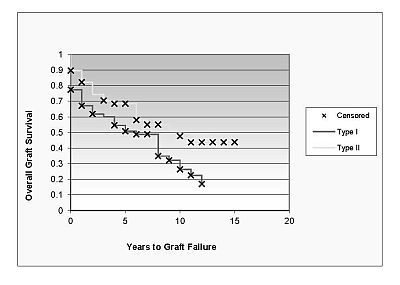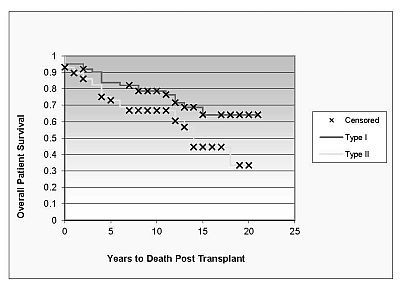Evolution of SPK Transplant in Type I and Type II Diabetics with End Stage Renal Disease: The 20 Year Experience, The
Surgery, Washington Hospital Center, Washington, DC
Meeting: 2013 American Transplant Congress
Abstract number: C1384
Introduction: There continues to be much debate whether Type II diabetics can benefit from a SPK. We are reporting our 20 years experience in patients with end stage renal disease and diabetes mellitus who received a SPK transplant.
Methods: 173 Patients with end stage renal disease secondary to diabetes mellitus received a SPK transplant between 1989 and 2008, and were stratified by diabetes type.
Results: Refer to table I for patient characteristics. Type II diabetics had better graft survival than Type I diabetics, p=0.032; while Type I patients, had better patient survival than Type II patients (p=0.045).
| Type I (N=115) | Type II (N=58) | P-Value | |
| DM Age of Onset | 15.14 (±7.58) | 24.2 (±10.54) | P<0.0001 |
| Age of Transplant | 38.5 (±7.96) | 42.8 (±8.40) | P=0.0012 |
| Mean C-Peptide | 0.33 (±0.2) | 5.34 (±3.66) | P<0.0001 |
| Pre Transplant BMI | 23.1 (±3.4) | 26.09 (±4.4) | P<0.0001 |
| Post Transplant BMI | 24.7 (±4.7) | 29.7 (±6.3) | P<0.0001 |
| Years Maintained on Insulin | 22.5 (±7.16 | 19.19 (±7.08) | P=0.012 |
| Recipient's Race | 41.7% African American | 68.9% African American | P=0.007 |
| Graft Survival | 65.5% | 58.6% | P=0.006 |
| Pt. Survival | 83.4% | 75.8% | P=0.228 |
| Experienced Rejection | 43.5% | 41.8% | P=0.793 |


Conclusion: Previous data had demonstrated that there were no differences at 5, 10, and 15 years post transplant. However, there appears to some differences at the 20 year follow-up. Type II patients had better graft survival, while Type I patients had better patient survival, which may be an indication at the age when patients were transplanted. Future studies should be conducted to follow long term follow-up and ascertain if those noted differences were true and not secondary to intrinsic population variables.
To cite this abstract in AMA style:
Light J, Tucker M, Orquiza M. Evolution of SPK Transplant in Type I and Type II Diabetics with End Stage Renal Disease: The 20 Year Experience, The [abstract]. Am J Transplant. 2013; 13 (suppl 5). https://atcmeetingabstracts.com/abstract/evolution-of-spk-transplant-in-type-i-and-type-ii-diabetics-with-end-stage-renal-disease-the-20-year-experience-the/. Accessed February 16, 2026.« Back to 2013 American Transplant Congress
